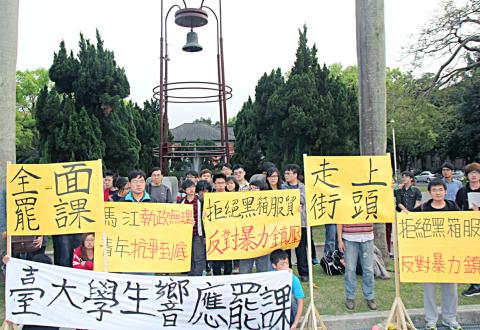Decrying the strong-arm tactics used by police against protesters early yesterday morning in Taipei, the National Taiwan University (NTU) students’ association backed a call by protest leaders Chen Wei-ting (陳為廷) and Lin Fei-fan (林飛帆) for a nationwide “strike.”
As of press time yesterday, more than 45 student groups, totaling 3,000 students from 18 universities — including National Tsing Hua University, National Chengchi University, National Chiao Tung University and National Cheng Kung University — had joined the strike call.
“The government not only failed to respond to the public’s demands, but also took inappropriate measures to attack students, violently suppress them, hurt the country’s backbone and trample on basic human rights,” the NTU group said about the crackdown on the protesters who tried to occupy the Executive Yuan on Sunday night.

Photo: CNA
The statement called for a “strike” on four fronts: putting classes on hold so that students can join protests; holding classes on-site at the protests; teacher support for students’ decision to protest and leniency for those students participating in the demonstrations.
Ko Chih-che (柯志哲), the head of NTU’s sociology department, also issued a statement of support.
The focus of the department’s education and research is on civic participation, procedural justice and social equality, Ko said, adding that: “The department is supportive of all student-organized strikes as long as personal safety is taken into consideration, and it encourages any methods to understand or participate in the development of relevant proceedings.”
NTU Secretary-General Lin Ta-te (林達德) said the university is primarily concerned with the rights of education and the school’s normal operations and procedures.
While strikes are not the best solution to resolving the conflict, if all of the proceedings are in accordance with students’ rights of education and other Ministry of Education regulations, the university would respect any decision to reschedule or relocate classes, Lin said.
Meanwhile, Wang Hung-jen (王宏仁), a sociology professor at National Sun Yat-en University in Greater Kaohsiung, criticized President Ma Ying-jeou (馬英九) for remaining behind barricades and being unwilling to emerge to communicate with the public.
“The department’s teachers are willing to stand by our students in this most precious ‘democracy class,’” Wang said.
Wang said the department decided to suspend all courses until the siege has wound down, at which time it would offer make-up classes.
Students in the department have voted to join the strike.
Taipei Medical University’s administration said that students skipping classes to take part in the protests would not be counted as absent.
Other schools are being more cautious in their support.
Lan Yang Institute of Technology dean Lin Chiang-lung (林江龍) said the school would neither support its students’ participation in the protests, but would not try to block them. Those students who want to participate would have to talk with their teachers to call in an absence, he said.
Minister of Education Chiang Wei-ling (蔣偉寧) appealed to students to remain calm and for teachers at the site of protests to persuade student demonstrators to return to classes.
The ministry does not support student strikes, Chiang said, adding that the rights to education should be maintained for everyone.
Additional reporting by Loa Iok-sin, Chen Yi-ching and Hung Ting-hung

A preclearance service to facilitate entry for people traveling to select airports in Japan would be available from Thursday next week to Feb. 25 at Taiwan Taoyuan International Airport, Taoyuan International Airport Corp (TIAC) said on Tuesday. The service was first made available to Taiwanese travelers throughout the winter vacation of 2024 and during the Lunar New Year holiday. In addition to flights to the Japanese cities of Hakodate, Asahikawa, Akita, Sendai, Niigata, Okayama, Takamatsu, Kumamoto and Kagoshima, the service would be available to travelers to Kobe and Oita. The service can be accessed by passengers of 15 flight routes operated by

Chinese spouse and influencer Guan Guan’s (關關) residency permit has been revoked for repeatedly posting pro-China videos that threaten national security, the National Immigration Agency confirmed today. Guan Guan has said many controversial statements in her videos posted to Douyin (抖音), including “the red flag will soon be painted all over Taiwan” and “Taiwan is an inseparable part of China,” and expressing hope for expedited reunification. The agency last year received multiple reports alleging that Guan Guan had advocated for armed reunification. After verifying the reports, the agency last month issued a notice requiring her to appear and explain her actions. Guan

GIVE AND TAKE: Blood demand continues to rise each year, while fewer young donors are available due to the nation’s falling birthrate, a doctor said Blood donors can redeem points earned from donations to obtain limited edition Formosan black bear travel mugs, the Kaohsiung Blood Center said yesterday, as it announced a goal of stocking 20,000 units of blood prior to the Lunar New Year. The last month of the lunar year is National Blood Donation Month, when local centers seek to stockpile blood for use during the Lunar New Year holiday. The blood demand in southern Taiwan — including Tainan and Kaohsiung, as well as Chiayi, Pingtung, Penghu and Taitung counties — is about 2,000 units per day, the center said. The donation campaign aims to boost

The Central Weather Administration (CWA) said a magnitude 4.9 earthquake that struck off the coast of eastern Taiwan yesterday was an independent event and part of a stress-adjustment process. The earthquake occurred at 4:47pm, with its epicenter at sea about 45.4km south of Yilan County Hall at a depth of 5.9km, the CWA said. The quake's intensity, which gauges the actual effects of a temblor, was highest in several townships in Yilan and neighboring Hualien County, where it measured 4 on Taiwan's seven-tier intensity scale, the CWA said. Lin Po-yu (林柏佑), a division chief at the CWA's Seismological Center, told a news conference